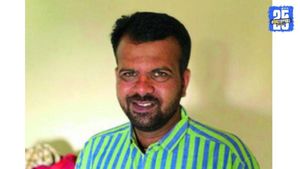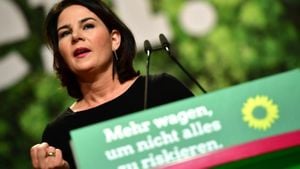Former Secretary of State Mike Pompeo is set to begin his fellowship at Columbia University, marking his return to academia and public life following his tenure under President Donald Trump. Starting March 1, 2024, Pompeo will serve as a Carnegie Distinguished Fellow at the Institute of Global Politics (IGP), part of Columbia's School of International and Public Affairs (SIPA). His appointment will last through February 2026, during which he will teach courses on public diplomacy, decision-making, and organizational leadership.
"I am thrilled to join the Institute and to provide a unique voice defending traditional American values and the Founders’ vision for our great nation, alongside the necessity to support our allies across the world," Pompeo stated. He expressed his eagerness to engage with the university community and participate in the exchange of ideas central to academic discourse, reaffirming his belief in the importance of teaching about America's strengths. "I’m uninterested in the name of the institution on their diploma, and deeply interested in what it is they know," he told The Wall Street Journal, highlighting his concern over American education.
The announcement of Pompeo's appointment arrives amid heightened scrutiny of Columbia University following various incidents of antisemitism on campus, especially after the escalation of protests related to the Israel-Hamas conflict. Over the past year, Columbia has witnessed numerous demonstrations, some of which involved vocal pro-Palestinian activists disrupting classes. These actions have drawn criticism from Republican lawmakers, who argue they reflect broader liberal biases rampant within elite universities.
Columbia has increasingly responded to concerns about campus climate by implementing disciplinary measures against those accused of antisemitic behavior. For example, following significant protests, the university suspended at least one student and strengthened security around classes related to Jewish studies. Two activists from Barnard College, Columbia's sister institution, were reportedly expelled for their roles in the disruptions. A university spokesperson noted, "The Institute of Global Politics at Columbia SIPA is honored to welcome former Secretary of State Pompeo to its current cohort of IGP Carnegie Distinguished Fellows," emphasizing the commitment to diverse opinions.
Pompeo's appointment also strategically aligns with Columbia's goals of fostering inclusive dialogue. During his tenure, he is expected to attract students from various backgrounds, especially those who may hold conservative views contrary to the prevailing liberal atmosphere. "I suspect Columbia's outreach was intentional... someone with a view very different than most of the faculty," he affirmed to the Journal.
This growing dichotomy on campus follows President Trump's recent emphasis on curbing diversity, equity, and inclusion initiatives, actions many conservatives believe threaten academic freedom and merit-based education. Pompeo's stance has been candid; he supports the administration's focus on reversing what he describes as excessive liberalism influencing educational institutions.
Columbia's decision to invite Pompeo to its ranks is partly seen as a response to growing calls for diverse political representation on campuses. This move could be interpreted as both proactive and reactive. While it aims to counterbalance liberal opinions, it also addresses widespread concerns raised by donors and alumni demanding more conservative perspectives be visible at prestigious institutions.
Critics, particularly those from the left, may view Pompeo's acceptance as potentially exacerbated tensions, especially since Columbia has recently become the epicenter of protests criticizing Israel's policies and actions. The controversy surrounding Pompeo's earlier support of the Trump administration's foreign policies, particularly those concerning Israel's relationship with neighboring Arab states, highlights the complicated nature of his role at Columbia.
Pompeo garnered significant attention during his time as Secretary of State for championing agreements like the Abraham Accords, normalizing relations between Israel and several Arab nations. Despite his controversial views and affiliations, university officials believe his experience will enrich the academic environment. Keren Yarhi-Milo, Dean of the International Relations School, spoke highly of Pompeo’s extensive experience, noting it would contribute to the rich exchange of ideas defining the academic community.
Through the lens of this appointment, the broader debate on political discourse and the responsibilities of academic institutions surfaces. While Pompeo may serve to facilitate dialogue across ideological spectrums, how Columbia navigates this space amid criticisms could shape its future academic atmosphere.
Mike Pompeo's arrival at Columbia serves as both a bellwether and focal point of larger national conversations about education, ideology, and the boundaries of free speech versus hate speech. The impact of his tenure is yet to be seen but is certain to provoke discussions and engagements deeply rooted in the current political climate.



